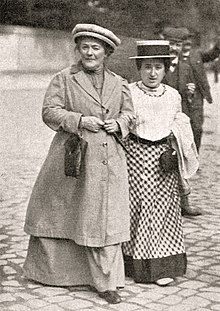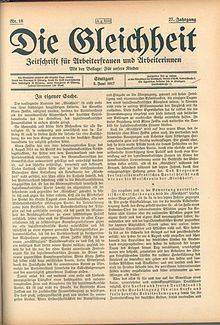Clara Zetkin
[3] In July 1857,[4] Clara Josephine Eißner (Eissner) was born the eldest of three children in Wiederau [de], a peasant village in Saxony that is now part of the municipality of Königshain-Wiederau.
[citation needed] Because of the ban placed on socialist activity in Germany by Otto von Bismarck in 1878, Zetkin left for Zürich in 1882 and then went into exile in Paris, where she studied to be a journalist and a translator.
[1] She also adopted the name of her lover, the Russian-Jewish Ossip Zetkin [de], a devoted Marxist, with whom she had two sons, Maxim and Konstantin (known as Kostja).
Within a few months of attending and taking part in socialist meetings, Zetkin became entirely committed to the party, which offered a Marxist approach to the demand for women's liberation.
Despite Luxemburg's indifference to the women's movement, which absorbed so much of Zetkin's energies, they became firm political allies on the far left of the SDP.
[10] In the debate on Revisionism at the turn of the 20th century, they jointly attacked the reformist theses of Eduard Bernstein, who had rejected the ideology of a revolutionary change in favour of "evolutionary socialism".
[15] Inspired in part by American socialists' actions, Zetkin, Käte Duncker and others proposed that "a special Women's Day" be organized annually, but no date was specified at that conference.
One of her primary goals was to get women out of the house and into work so that they could participate in trade unions and other workers rights organizations to improve conditions for themselves.
[24] Their combined efforts pushed for systematic changes such as labor protections, childcare facilities, women's suffrage, and dismantling the bourgeois societal norms.
[25] All of this would eventually become for naught as Stalin assumed political power in the Soviet Union, as women's reproductive health and personal liberties began to be stripped away.
[26][27] During the period of the First World War, at the international women's peace conference in Switzerland, activists, revolutionaries, and supporters gathered to confront the concern for unity among workers across the battle lines.
[32] In her journal entries outlining their conversations, she discussed her admiration for his leadership as he used his position of power to give a voice to the oppressed people.
[31] Included in speaking for the voices of the oppressed, Lenin discussed with Zetkin the need to establish an international women's movement.
[32] In addition to the conversation's rhetoric, Lenin's respect for Zetkin is evident as he employed her to establish the women's movement based on the principles of Marxist theory.
[32] Zetkin was allocated a position to provide support to the women's rights committee drafting a resolution, theses, and directives to move along the progression of the movement.
[32] Because of its previous success in bringing women's emancipation in both theory and practice, Zetkin subscribed to the socialist movement in the early 1920s.
She opposed a policy decision made in Moscow in 1928 to get communist trade unions in Germany to split from the main socialist-dominated federation and form the rival Rote Gewerkschaftsbund.
[34] In August 1932, despite having recently fallen gravely ill in Moscow, she returned to Berlin to preside over the opening of the newly elected Reichstag, as its oldest deputy.
Before this compelling historical necessity, all inhibiting and dividing political, trade union, religious and ideological opinions must take a back seat.
[8] Zetkin's literary involvement began in 1892 when she started editing and writing for the SDP women's newspaper, Die Gleichheit, which translates to Equality.
As Zetkin subscribed to the communist model of reform, her writings continued to outline and advocate for women to join her in her adherence.
[38] The periodical rejected “bourgeois feminism,” which was not an outrageous claim for Zetkin and advocated for women to become workers in the proletarian state.
[39] Stalin's politics stunted and regressed much of the progress of the women's movement in the Soviet Union, returning the country to be based in conservative ideals.
[41] The rise of Stalin's bureaucracy in the Soviet Union dissolved the relationship the women's movement established with the government under the leadership of Lenin.



